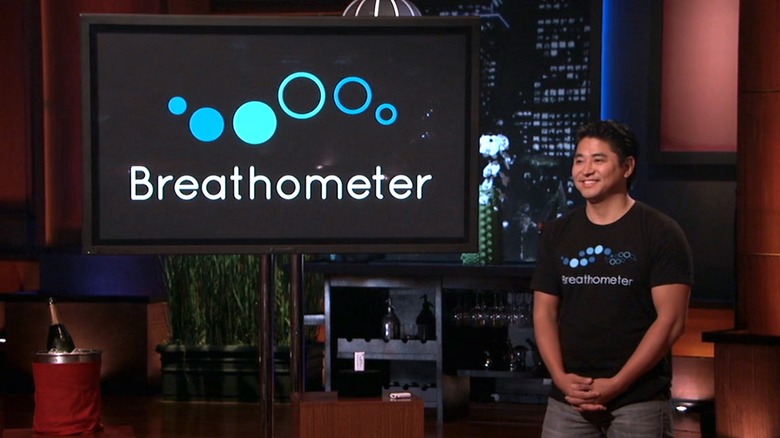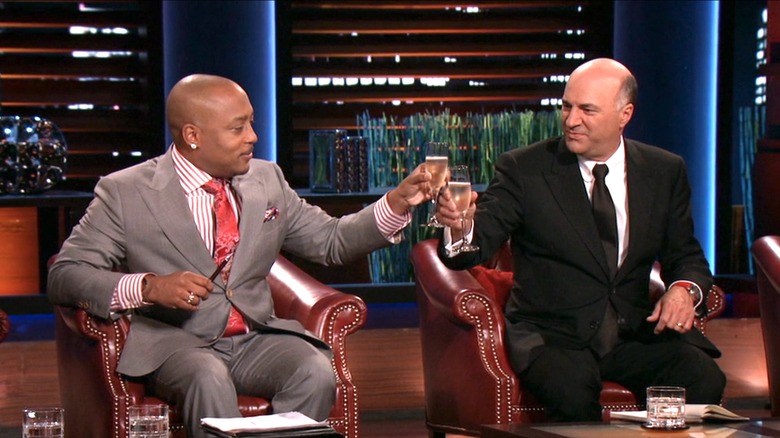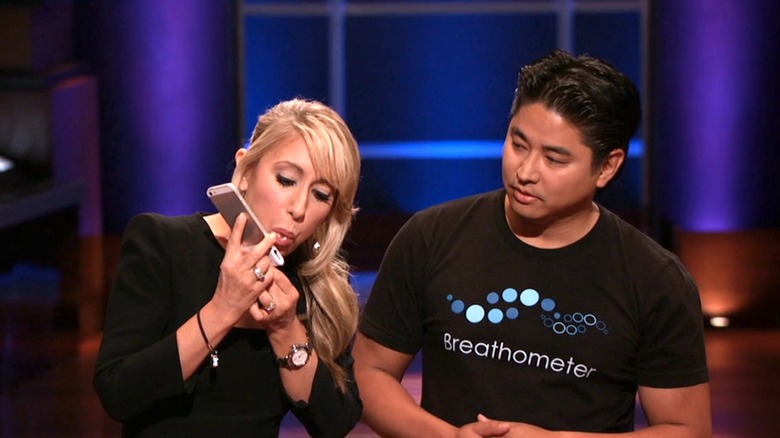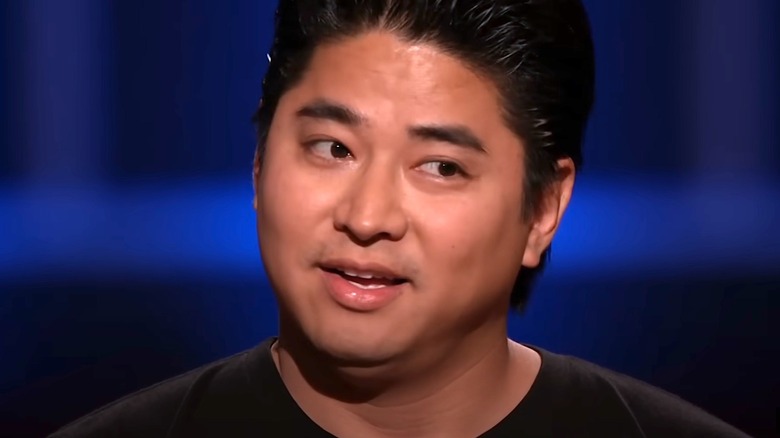What Happened To The Breathometer Breathalyzer From Shark Tank Season 5?
Since its 2009 debut on ABC, the hit reality series "Shark Tank" — which features would-be entrepreneurs pitching their products to, and hoping to secure financial backing from, a panel of celebrity investors — has remained a solid ratings grabber for the network. Even as the show is set to lose perhaps its biggest star when Mark Cuban makes his ensuing exit, "Shark Tank" still seems primed to be a force in the network landscape for the foreseeable future.
That's in no small part because the panel of celebrity investors isn't necessarily the reason viewers continue to tune in from one week to the next, with the series' occasionally kooky pitchers and products — i.e., the infamous Sullivan Generator – arguably serving as the true stars of the show. From that vast slate of entrepreneurial hopefuls, "Shark Tank" viewers have no doubt come to expect the unexpected. Despite the fact, during a Season 5 pitch, Breathometer Founder and CEO Charles Michael Yim managed to do something that even diehard fans of the series couldn't have anticipated by closing a single deal with all five sharks on that episode's panel.
What product could have possibly tempted that motley crew of shrewd dealmakers to throw in together, you ask? Yim was pitching his Breathometer Breathalyzer device, which works in conjunction with a smartphone to tell you if your Blood Alcohol Content is too high to legally operate a motor vehicle. Here's what happened to Yim and his Breathometer after "Shark Tank."
What happened to Breathometer on Shark Tank?
As for Charles Michael Yim's pitch, the Breathometer mastermind walked onto the "Shark Tank" soundstage, boasting Silicon Valley success and a potentially life-saving product that was positioned to grow in market value. After throwing around some impressive sales figures, Yim tells the panelists that the funding he seeks is needed to ramp up production of his device.
Even still, the sharks are wary as there are already several personal breathalyzer devices on the market, and questions of potential legal ramifications from inaccurate readings are posed. Yim is quick to squash the first concern, pointing out that other personal breathalyzers are bulky and inconvenient, then demonstrating that his device is small enough to fit in your pocket. Moreover, he posits that the Breathometer is unique in that it utilizes a mobile phone app. Yim, however, appears to slightly dance around the question of legal entanglements, and as we'll discuss later, that comes back to, ahem, bite the sharks.
In any case, Yim demonstrates how the device works by offering champagne to the sharks, then letting Lori Greiner use the device for herself. The sharks are clearly taken with the Breathometer's possibilities, and the bidding soon exceeds Yim's ask of $250,000 for 10% of his company. Mark Cuban tenders the first potential deal, offering $500,000 for a 20% stake in Breathometer. The other sharks also make tempting individual offers before deciding they'd be wiser to team up instead. Though Cuban initially doesn't want to work with his co-stars, they're able to wrangle him into the offer, shaking with Yim on a first-ever 5-shark deal that's worth $1 million in exchange for 30% of Breathometer.
What happened to the Breathometer App after Shark Tank?
That deal no doubt far exceeded any Charles Michael Yim might've anticipated when he began his pitch. Moreover, the $1 million deal was approved via a brief call with his Breathometer CFO, as it meant the company could forgo the round of venture capital meetings they'd been planning after the "Shark Tank" appearance. Given that fact, Yim walked out of the studio thrilled with the turn of events. Likewise, the sharks were clearly happy to be in business with the Breathometer team.
So much so, the deal was one of few "Shark Tank" agreements that actually did go through after the 2013 primetime appearance, though that was apparently not a good thing for the sharks who threw in with Breathomter. While the company reportedly saw solid growth after the "Shark Tank" closeup, things began to go south in the years thereafter. First, it seems that, despite the backing, Breathometer faced significant challenges in fulfilling orders. Even more problematic was that the breathalyzer began to face questions over its accuracy.
By 2016, Breathometer was actually pivoting away from the breathalyzer game and instead focusing their device on gauging users' oral health, a concept Yim briefly mentioned during his pitch. A likely reason for the pivot became clear in 2017 when the Federal Trade Commission — which recently also targeted retail giant Amazon – filed a complaint against Breathometer, alleging the company had essentially been fraudulent in claiming its device accurately reads a user's BAC. Yes, this is just the sort of legal entanglement the sharks gave Yim a pass on during his pitch. And yes, the issue led to dire consequences for Yim and his company.
What's next for the Breathometer Breathalyzer app?
Apart from the FTC's initial worries over the inaccuracy of the Breathometer, the commission was further concerned with how the company responded to the claims, alleging that Charles Michael Yim and his team tried to fix the problem not by improving the accuracy of readings, but instead by recalibrating the device to overestimate a user's BAC. Whatever the case, by 2016, the company had fully disabled the breathalyzer function on Breathometer.
In the end, disabling the breathalyzer function on the Breathometer was not enough, with the FTC ultimately ordering Yim and his company to provide full refunds to anyone who'd purchased the device. Though a major financial blow to Yim and Breathometer, the company forged ahead with Mint, which Yim discussed with Kevin O'Leary during a 2016 "Beyond the Tank" segment. However, it appears that Mint did not take off as hoped, and the device is no longer offered for sale through the company or any retail outlets.
Breathometer's post-"Shark Tank" drama has been shocking, to say the least, with Mark Cuban famously touting the deal as the worst he'd made during a 2022 chat with CNBC. Cuban, of course, staked $500,000 of his own money to close the deal, which was twice as much as any other shark. As of that 2022 interview, it would seem he may have taken a total loss on the Breathometer deal. However, in the same article, Yim claimed the sharks might still turn a profit, noting Mint had agreed to be acquired. However, it's unclear if that sale ever closed, and with Yim's company apparently out of business, the "Shark Tank" crew will likely never recoup their investments.
What is Charles Michael Yim up to today?
While Charles Michael Yim was ultimately unable to keep Breathometer together after securing that $1 million buy-in from the "Shark Tank" panel, his Linkedin page notes that he was guiding the company through good times and bad for just over 11 years, noting he officially left the company in 2023. With Breathometer products no longer available on the market, it is presumed that the company itself likely folded around the same time.
While Yim was no doubt sad to see Breathometer not live up to expectations, he did not take the loss lying down. In fact, he's continued to do what any entrepreneur would, taking his experiences from running that company and applying them to other ideas and concepts, some of which he was actually developing while serving as Breathometer's CEO. Among his current ventures is Skeleton Labs, an AI-driven 3D pose recognition tech platform with sports and fitness applications for which Yim serves as Founder and Executive Chairman.
The entrepreneur currently also serves in the capacity of VitaBowl, a popular subscription-based health food service that offers virtual Telehealth consultations with dietitians. Yim is also continuing to build out his tech portfolio as a Founding Partner for a pair of Silicon Valley-based VC studios in cMy Ventures and SyncVC.



